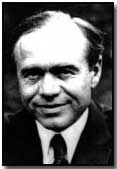Who's Who - Lord Beaverbrook
 Born in Ontario,
Sir William Maxwell Aitken (1879-1964), later ennobled as Lord Beaverbrook,
was initially a successful Canadian financier before retiring from business in 1910
to embark upon a political career.
Born in Ontario,
Sir William Maxwell Aitken (1879-1964), later ennobled as Lord Beaverbrook,
was initially a successful Canadian financier before retiring from business in 1910
to embark upon a political career.
In 1910 he took up a seat in the House of Commons, where he represented Ashton-under-Lyne for the Conservative party.
With good political connections, and a close friend of future Prime Minister David Lloyd George, Aitken served on the Western Front from early in 1915 as a journalist attached to Canadian forces (as 'Canadian Eye Witness'). In May 1915 Aitken was appointed as the Canadian force's official records officer and, from 1916, the Canadian government's official representative in France.
In 1916 Aitken published a three-volume account of the war from the Canadian viewpoint, Canada in Flanders, which quickly established itself as a bestseller.
Aitken was ennobled as Baron Beaverbrook by Lloyd George (now Prime Minister, succeeding Asquith) in 1917 and appointed to the London government on 10 February 1918, as Minister of Information - dealing with government propaganda, where he worked alongside notables including Charles Masterson and John Buchan (the latter author of the bestselling war stories The 39 Steps, Greenmantle and Mr Standfast).
Beaverbrook's elevation to government was at least in part due to his role in engineering Asquith's ousting as premier with Lloyd George as his replacement in December 1916.
An energetic man, Beaverbrook immediately set about a coordinated British propaganda programme, responsible for the dissemination of war information at home, among Allies and in neutral countries. His close colleague, Lord Northcliffe, meanwhile was responsible for directing propaganda towards the populations of enemy nations.
Clever in his use of propaganda, Beaverbrook commissioned a series of poster campaigns designed by famed artists of the period, and encouraged successful authors to write pamphlets and newspaper articles; the latter group included such luminaries as Rudyard Kipling, H G Wells and Sir Henry Newbolt, as well as Buchan).
Beaverbrook also pioneered the design and use of photographic posters for recruitment purposes at home, and introduced cinema newsreels.
A dispute over jurisdiction with the Foreign Office prompted Beaverbrook's resignation in October 1918 (Beaverbrook was keen to arrange for the dropping of millions of leaflets designed by his department into enemy territories).
A powerful owner of numerous popular newspapers including the Daily Express and the London Evening Standard, Beaverbrook spent the period between the First and Second World Wars in advocating the benefits of British imperial unity. With the renewed outbreak of war in 1939 and Winston Churchill's appointment as Prime Minister in 1940, Beaverbrook returned to government, serving as Minister for Aircraft Production (1940-41), Minister of Supply (1941-42), Minister of War Production (1942) and Lord Privy Seal (1943-45).
Beaverbrook's numerous volumes of memoirs sold well and included Politicians the Press (1925), Politicians and the War (1928) and Men and Power (1956). He died in 1964.
"Wipers" was the British nickname for the Belgian town Ypres.
- Did you know?
